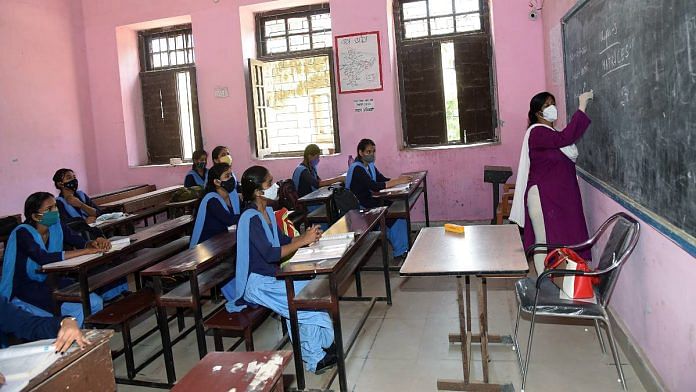Thank you dear subscribers, we are overwhelmed with your response.
Your Turn is a unique section from ThePrint featuring points of view from its subscribers. If you are a subscriber, have a point of view, please send it to us. If not, do subscribe here: https://theprint.in/subscribe/
On a Sunday afternoon in February 2008, I found myself in a taxi wheeled by a tense driver. As we crossed Tilak Bridge in Dadar we were attacked by an angry mob hurling stones. The aggressors were workers of the Maharashtra Navnirman Sena agitating against North Indian immigrants especially from Uttar Pradesh and Bihar taking up jobs in Mumbai. Sixteen years later I vividly remember the panic and anxiety of the driver as he deftly avoided the mob exiting into the bylanes of Parsi Colony.
A decade later as a Teach For India Fellow I served students whose families migrated from Uttar Pradesh and Bihar. Most families had relocated for low to medium skilled jobs but more importantly to educate their children in better schools hoping that they complete higher education and obtain salaried jobs. The problem with the Bihar education system has been chronic for decades and migration has continued to be the preferred choice for the majority as late as 2020. Even the 2023 ASER survey found that students aged 14-16 in Bihar performed worse than the average on almost all literacy and numeracy parameters. These problems are often lamented in media and development literature, but the million-dollar question remains: How can we really transform the school education system of the state? How can we ensure high-quality and relevant skills for students exiting schools in Bihar?
The fantastic reforms implemented by the Additional Chief Secretary, KK Pathak partially answer that question. In one year, Pathak took radical steps to improve the system by adding teachers, introducing unannounced inspections in schools and cracking down on coaching classes. In return, he received flak for his quasi-authoritarian way of working and strict action against teachers, principals and administrators not discharging their duty. As a result of the backlash from across the political spectrum and despite the support from the Chief Minister, Pathak resigned in January. One can only speculate the role of the political pressure played in his resignation. As a former teacher and education policy enthusiast, this is disheartening news. The dynamic reforms taken by the officer in the last year were key to move some of the slothful mountains constraining quality education in Bihar for decades.
I believe that we need such tough officers willing to take tough unpopular decisions to deliver high quality public services especially in education and healthcare to support low income communities. Such officers can play a critical role to galvanize middle management and front line staff members most importantly school principals leading to better service delivery in schools. Second, with the power vested in them they can combat stakeholders negatively impacting the education system such as the coaching mafia, pre-service teacher training colleges etc. and minimize external harm. Third, like ACS KK Pathak’s commanding presence, a confident officer in charge of education can instill confidence in parents and ensure they support their children at home and reduce demand for coaching classes. This will eventually trickle down to increased student investment driving the demand for better quality and relevance of education.
However, not everything about KK Pathak’s approach is rosy and will definitely not lead to a sustainable system transformation. Some of Pathak’s steps such as constraints on what teachers wear to school and excessive time on administrative reporting can make the job painful for teachers and dissuade them from putting in their best efforts in classroom instruction. Such a heavy handed approach can perhaps at best kickstart a slothful system by inducing fear. But for frictionless long term operations requires officers to build a culture of excellence and invest the middle management of the education department to perpetuate best practices. So how can governments implement this?
Governments can look to depute two officers splitting functions to discharge duties especially in education and healthcare. Engaging and negotiating with tough stakeholders requires a dual approach of aggressive decision making and calm negotiation and reconciliation. A good cop working in tandem with a tough “bad cop” like ACS KK Pathak. The good cop can continue to serve the purpose of ensuring school principals and middle management continue the good work once the initial kick start of the stricter approach slowly withdraws, thereby ensuring that our schools continue to serve students and parents in the future generation as well. Indian states can perhaps borrow a page from the American democracy playbook by increasing media accountability of officers holding top positions in education and healthcare. A prime example is the Chancellor of New York City public schools whose work is heavily scrutinized by the media.
In 2022, when the current Chancellor, David Banks took office, he outlined a vision document which subsequently became the reference point for stakeholders, especially parents to hold him and the rest of the administration accountable. In India, where a large section of public schools cater to students whose parents may not be as skilled to hold the administration accountable, the media, nonprofits and think tanks can play that role but like in any democracy the voters would be the pinnacle of accountability, and India will soon get there.
In 2014 during an intensely contested college election, a classmate when discussing politics while taking a drag from his Gold Flake told me with gusto, “Ek Bihari Sab Pe Bhaari”. If the highly capable students from Bihar and other relatively underdeveloped parts need to actualize their potential before we face a demographic disaster, we need faster reforms and we need decision oriented, fearless IAS officers like KK Pathak.
These pieces are being published as they have been received – they have not been edited/fact-checked by ThePrint

